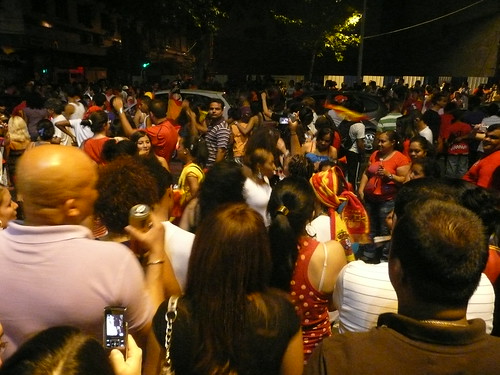Yes, “We are the champions”, and the song did play Monday night during the 4 hour parade of the Spanish team through Madrid. So many people, over half a million, crowded the streets that the city officials requested that no one else go to the stage at the end.
I showed my spirit and predicted the winner by buying a team Jersey and a cap before the game.

 On our way home from one sister-in-law´s house to another, we waded through the jubilant crowds. Here is one such crowd filling the Bravo Murillo street shortly after midnight Sunday. I don´t know if you can tell, but a lot of the celebrants are Latin American immigrants. The World Cup made a lot of proud Spaniards, many of whom are Spanish only by residency. 15% of the Spain´s students are immigrants, most of them from Latin American but many also from Eastern Europe, Africa and Asia. There is some resentment, especially during the economic crisis and high unemployment, but the truth is their children are rapidly being assimilated and they provide labor in areas the Spanish are unlikely to cover on their own, especially elderly care.
On our way home from one sister-in-law´s house to another, we waded through the jubilant crowds. Here is one such crowd filling the Bravo Murillo street shortly after midnight Sunday. I don´t know if you can tell, but a lot of the celebrants are Latin American immigrants. The World Cup made a lot of proud Spaniards, many of whom are Spanish only by residency. 15% of the Spain´s students are immigrants, most of them from Latin American but many also from Eastern Europe, Africa and Asia. There is some resentment, especially during the economic crisis and high unemployment, but the truth is their children are rapidly being assimilated and they provide labor in areas the Spanish are unlikely to cover on their own, especially elderly care.





